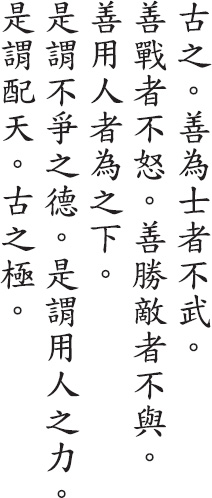68
 |
In ancient times the perfect officer wasn’t armed the perfect warrior wasn’t angry the perfect victor wasn’t hostile the perfect commander acted humble this is the virtue of nonaggression this is using the strength of others this is uniting with Heaven which was the ancient end |
CHIAO HUNG says, “In ancient times, officers went into battle in chariots. They were dressed in mail, and there were three to a vehicle: one on the left armed with a bow, one on the right armed with a spear, and one in the middle in charge of the reins, the flag, and the drum. Below and arrayed around every chariot were seventy-two foot soldiers.”
SUN-TZU says, “A ruler must not mobilize his armies in anger. A general must not engage the enemy in wrath. Anger can turn to joy, and wrath can turn to gladness. But once a state is destroyed, it cannot be restored. And once a person is dead, he cannot be reborn” (Suntzu Pingfa: 12.18–21). Sun-tzu also says, “To win every battle is not supreme excellence. Supreme excellence is to conquer without fighting” (3.2).
HO-SHANG KUNG says, “Those who honor the Way and Virtue are not fond of weapons. They keep hatred from their hearts. They eliminate disaster before it arises. They are angered by nothing. They use kindness among neighbors and virtue among strangers. They conquer their enemies without fighting and command through humility.”
LIEH-TZU says, “Those who govern others with worthiness never win them over. Those who serve others with worthiness never fail to gain their support” (Liehtzu: 6.3).
WANG CHEN says, “You must first win others’ hearts before you can command them.”
KUMARAJIVA says, “Empty your body and mind. No one can fight against nothing.”
WU CH’ENG says, “Even though our wisdom and power might surpass that of others, we should act as if we possessed neither. By making ourselves lower than others, we can use their wisdom and power as our own. Thus, we can win without taking up arms, without getting angry, and without making enemies. By using the virtue of nonaggression and the power of others, we are like Heaven, which overcomes without fighting and which reaches its goal without moving.”
TZU-SSU says, “Wide and deep, they are able to support others. High and bright, they are able to protect others. Those who are wide and deep unite with Earth. Those who are high and bright unite with Heaven” (Chungyung: 26.4–5).
TE-CH’ING says, “Heaven is yang and Earth is yin. But if Heaven and Earth remain stationary, everything stops, and nothing comes into existence. Only when yang descends and yin rises does everything flourish. Thus, Heaven’s position is to be above, but its function is to descend. When sages are above the people, and their hearts are below, we call this uniting with Heaven. This was the polestar of ancient rulers.”
Some editions drop the opening phrase, ku-chih (ancient times), and combine this with the previous verse. I have followed the Fuyi edition in retaining it. Mawangtui B has ku (thus). In line seven, both Mawangtui texts omit the phrase chih-li, “the strength of,” but no other edition follows suit. Finally, some later commentators read the last two lines as one line, eliminating ku (ancient) as a copyist error: “We call this the end of uniting with Heaven.” But this is not supported by any early text or commentary. This verse is not present in the Kuotien texts.